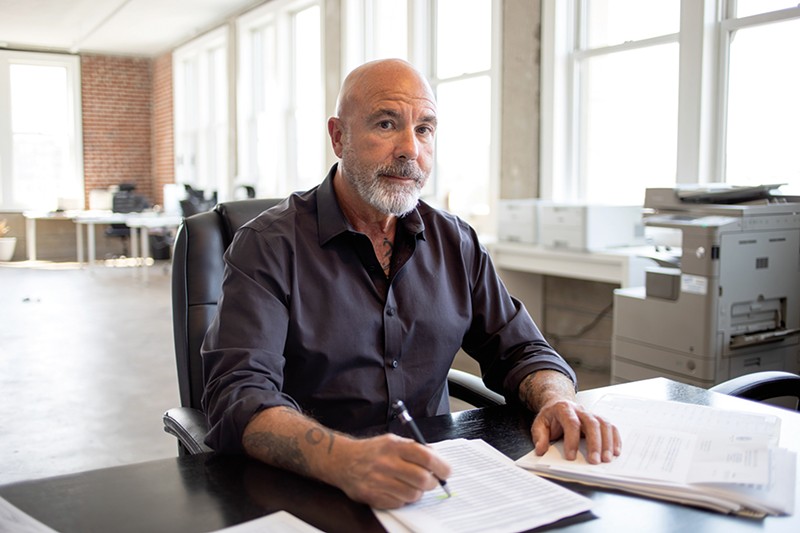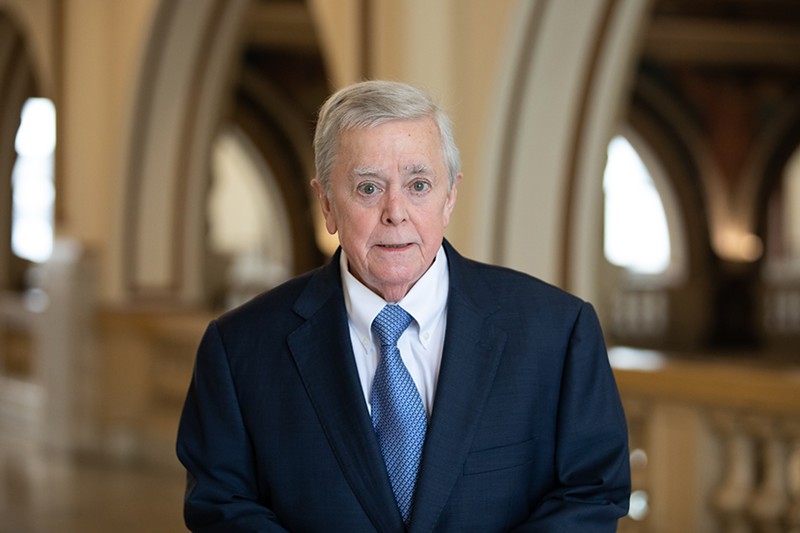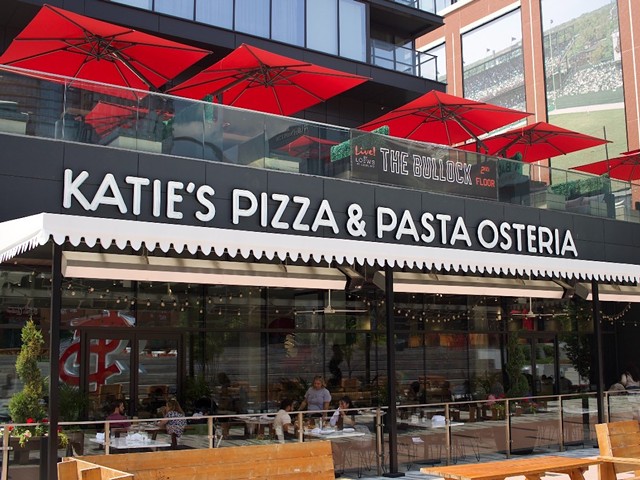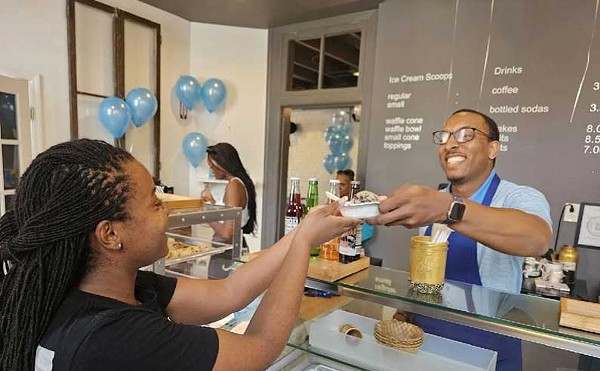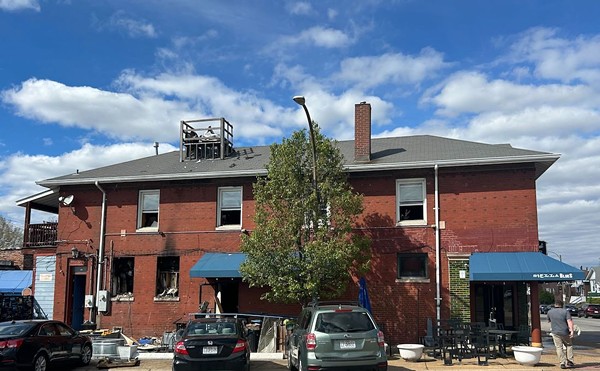
Fried chicken and beer. The two are inseparable in Korean culinary culture, explains Erica Park from behind the long wooden bar at her Carondelet neighborhood restaurant, Chicken Seven. As definitive a pairing as wine and cheese or tacos and margaritas, Korean fried chicken and ice cold beer are just always done together, according to Park. It's a thing — one that she and her husband, Sean Lee, were excited to bring to their newly adopted town of St. Louis after moving here from Seoul, via Texas, in 2021, and one you know they'd nail if you've ever eaten their succulent fried bird. Coated in crisp breading and gilded with honey-soy glaze, the searing hot dish was seemingly made to be washed down with an icy cold lager.
However, at Lee and Park's bar, the only beverages flowing are soft drinks.
"People still come in two years after we opened asking why we don't serve alcohol," Park says. "I want to tell them, 'I wish.'"
For 2½ years, Lee and Park have been unable to obtain a liquor license, shut out because they failed to obtain a majority of signatures from the residents and business owners surrounding their restaurant. It's a requirement they never imagined would be impossible to surmount — after all, their restaurant remains emblazoned with an Anheuser-Busch logo thanks to the building's past life as a bar. However, after failing on two occasions to get enough neighbors to sign, the couple has resigned themselves to being an alcohol-free establishment.
The decision has left their restaurant in a precarious spot.
"Our chicken is made to order and needs 25 minutes to cook," Park explains. "While people are waiting, they need something to drink, not just because it's a good pairing, but so they can relax and enjoy themselves." A Coke just doesn't do the trick.
While the restaurateurs' odyssey could be portrayed as an immigrant couple's struggle to navigate an unfamiliar government's bureaucracy, the difficulties that Lee and Park have faced are shared by many other St. Louis restaurant and bar owners, who have seen their attempts to get liquor licenses stymied by long delays, a maze of policies and procedures, antiquated systems and a signature-based neighborhood petition process that is difficult, if not impossible, to complete.
For years, this cumbersome process, administered by St. Louis' Excise Division, has been a source of shared frustration among hospitality professionals, who often vent among themselves about the cost of doing business in the city. This spring, as delays have become even more prolonged, many began speaking up, hoping that by sharing their stories and demanding changes to the process, they might bring a much-needed change that not only benefits their businesses but the city as a whole. More importantly, they see a streamlined, modernized process as sending an important message to would-be entrepreneurs that the city is open for business.
Right now, for many aspiring restaurant and bar owners, it feels closed.
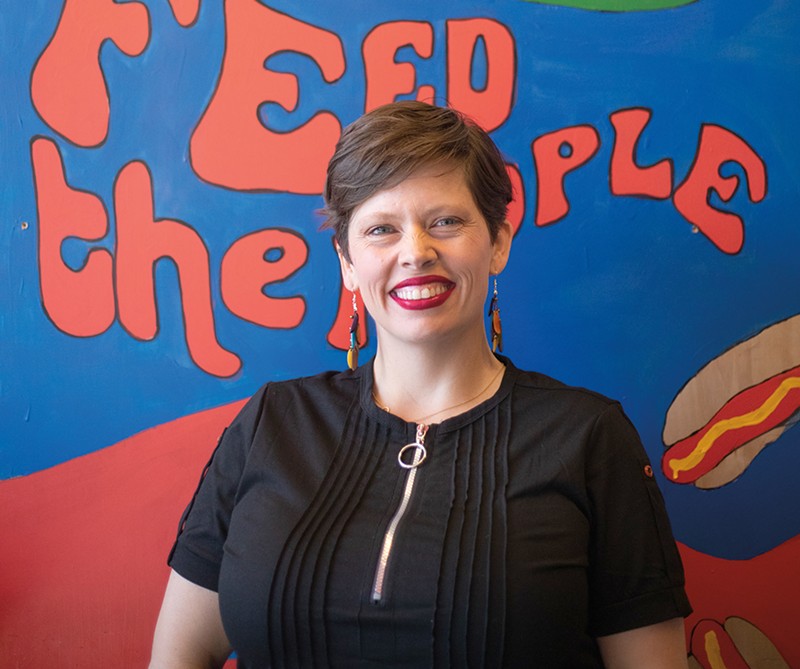
Danni Eickenhorst has been one of the most vociferous figures in this recent movement to amend the city's liquor license process. It's a role she has come to over the past two years as the owner of HUSTL Hospitality Group, parent company of Steve's Hot Dogs and the Fountain on Locust, as well as one she has been preparing for throughout her entire career with such organizations as Great Rivers Greenway and the Salvation Army.
"At this stage in my career, my primary focus is on building business opportunities so the amazing employees in our hospitality group can grow. We have really talented people who won't stay with us forever, so we are trying to grow and create new concepts, but it feels like the city, at times, is actively working against that, and I am not getting back what I put into the city," she says. "We all feel that, at the end of day, we are just trying to leave a mark in a positive way, and it would be nice to be able to do that."
Like Lee and Park, Eickenhorst has faced numerous delays in obtaining a liquor license for her businesses, beginning with Steve's Hot Dogs' move from Tower Grove East to its current storefront just a half-mile away on South Grand. Lengthy processing times delayed the restaurant's opening by three weeks — a difficult enough financial blow but, in retrospect, nothing compared to the six- to nine-month wait she has been quoted for a forthcoming business in the Delmar Maker District.
Eickenhorst acknowledges that staff shortages within the city's Excise Division, the sub-office of the Department of Public Safety that handles liquor licenses, have played a significant role in these delays, but she points to a cumbersome process as the main culprit, especially the city's signature requirement process. Her frustrations culminated in a tweet on March 30 in which she called upon her peers to join her in pressing the city to fix the process.
"The excise process in the City of St. Louis takes 6-9 months to go through," Eickenhorst tweeted. "In other municipalities, it takes just 2-4 weeks. It is *killing* investment in #STL City. I'm pulling together a letter to the Mayor & Board of Aldermen about the need to look at this process & improve it."
Eickenhorst received an overwhelming response, resulting in an open letter sent on April 3 to the city and the Board of Aldermen requesting improvement to the process. As she and her 22 fellow signatories see it, the delays at Excise are but one layer of a multi-faceted problem that begins with the city's requirements.
Title 14 of the St. Louis Code of Ordinances outlines a 19-step process that applicants must go through to serve alcohol. Some steps are straightforward: a completed application and $450 fee, paid personal property tax receipts, copies of lease agreements, occupancy and health department permits, and a photograph of the proposed entrance to the establishment.
The main sticking point, business owners say, is the city's requirement that they obtain neighborhood consent, which means gathering signatures from a majority of the property owners, occupants and tenants located within a 350-foot radius of the business.
On its face, this sounds reasonable; those who live and do business in a neighborhood should have a say about what happens there.
But while many business owners welcome the chance to get buy-in from their neighbors and even relish the opportunity to gather signatures door-to-door as a way to introduce themselves to the area, they chafe at the logistics. For a $100 fee, the Excise Division will provide a prospective bar or restaurant owner with the 350-foot plat from which they need to obtain signatures, as well as a list of property owners in it. However, this information is often incomplete and outdated, sending entrepreneurs down a rabbit hole that involves chasing down out-of-town investors, shuttered businesses that are still registered to a particular address and representatives from large companies — in Eickenhorst's case H&R Block — who are less than enthusiastic about getting involved in neighborhood goings-on.
And that's only one group from which prospective business owners must obtain signatures. Occupants and tenants make up a second class of interested parties; to qualify, they must be registered to vote at the address in question but often are not. Alternately, the city's lists are often not up to date, putting business owners in the position of chasing down people who no longer live in the neighborhood but are still required to sign because they remain on the rolls. Even those whose listings are accurate often won't answer their doors or reply to mailings from business owners; if they do, the Excise Division must verify the signatures by phone. Signees get two chances to answer; after a second failed attempt, their signature is thrown out.
"It's super laborious, and it takes us away from our business," Eickenhorst says. "Anytime you take away the people generating income from your core business, it's crippling. It became a part-time job for us to make it happen. The whole thing seems incredibly antiquated and can feel like I have to be very intrusive. I did insurance investigations in a previous career, and this is my jam. I can find anyone."
And yet, Eickenhorst still has to call Joe Kelly.
Bob Brazell remembers the excitement he felt when he was getting ready to open his debut restaurant, Byrd & Barrel, in 2013. That enthusiasm extended to collecting signatures door-to-door and introducing himself to neighbors in order to plant roots within the community.
It didn't take long for that excitement to wear off.
"My first [license] was probably in 2013, because we opened Byrd in 2015, and it took so long because I did the liquor license myself," Brazell says. "After doing that, I told myself I would never do that again. It was my first real restaurant of my own, and we wanted to knock on all the doors, introduce ourselves to the neighbors and businesses and let them know who we are and what we are trying to do. That process was hell."
That experience taught Brazell something that many hospitality pros have learned the hard way: If you're trying to get a liquor license in the city, you'd better call Joe.
"Joe" is Joe Kelly, a liquor license compliance specialist whose firm, Kelly & Associates, has been helping business owners throughout Missouri obtain liquor licenses for the past 35 years. No one mandates you use Kelly's services, though many business owners have found that the variable fee he charges to help them navigate the system — and obtain signatures — is well worth it.
Kelly says he can't grease the wheels. He has no fast-track to the front of the line. What he does have is 3½ decades of experience in dealing with the city and a staff whose sole responsibility is to work on liquor license applications.
He knows the city's bureaucracy inside and out — yet even he still feels bogged down at times.
"We probably work on about 50 percent of the applications in Excise and have been doing this for years, and I am still trying to figure out how somebody gets through this on their own," Kelly says. "I probably turn away at least a half-dozen people a month because I don't want to waste their money and our time because they could come by and write a check, and I can call them back in six months and tell them, 'Sorry, it won't happen.'"
In other words, even Kelly, with his full-time team experienced in gathering signatures, knows that some neighborhoods are a losing battle. Some, experience tells him, just will not sign. In those instances — as was the case for Chicken Seven — there is nothing he or the prospective restaurant owner can do.
Kelly understands the frustration that many business owners feel with the process, and he agrees that the recent delays, which he blames on Excise staffing, are unacceptable. However, he believes city officials could make changes to ease the burden. One would be to base the signature requirements upon zoning. The more residential the area, the more signatures required, Kelly suggests — with the goal of easing the requirements for establishments in industrial or commercial zones.
Kelly believes such changes would be a good step toward alleviating the burden on both the license applicants and officials within Excise — civil servants he sees "working their tails off" to get applications processed. He also knows how important it is to get liquor licenses approved quickly.
"Say I've been in the restaurant business for 15 years and want to sell, and along comes a restaurant broker with a buyer," Kelly explains. "The seller wants to get out; the buyer has financing in order. They want to close this deal, but the city says it's going to take six months to get a license, and even then it's a maybe. The buyer goes back to his broker and says, 'Yeah, I don't want to wait six months. The bank won't hold my loan for that long, so let's look in Maplewood, Webster Groves or Clayton where we can close the deal in 30 days or six weeks."
It's not just sales of existing businesses that are hurt by the city's lengthy application process. Kelly has had clients who want to open new businesses that require 8- to 10-month build-outs. They assume the best thing would be to have Kelly start right away on the liquor license. The problem is that he cannot guarantee that neighbors will sign off on the application, potentially leaving his client holding significant debt for a bar or restaurant that may not even be able to sell alcohol. While larger hospitality groups might be able to get a license approved in advance of breaking ground, smaller business owners might not be able to play that waiting game. Even something as seemingly straightforward as taking over an existing business — but needing new ownership of the license — can take months on end.
It's a dilemma Brazell faced when he opened his first restaurant in 2015.
"They have to think about what that does to a business owner," Brazell says. "You are either purchasing an existing property and getting a license in your name or starting a new business and new license. If you are purchasing an existing one, this can almost kill those deals because you are dealing with these six-month delays, and it affects the buyer and the seller. If it's a new business, you can't have the contractors sitting there for half a year while you're paying them, waiting for the license to come through. That's what we had to do with the original Byrd & Barrel."
For all of the difficulties that the signature portion of the liquor license process creates, Kelly does not think the city should do away with it altogether. He believes it offers a degree of protection for bar and restaurant owners since they'll know whether the community supports their application before the hearing stage. He also sees the signature process as diluting the potential influence of organized opposition. Without a petition process, a group of outspoken neighbors could send a team of lawyers to a liquor license hearing in a show of force, quashing an applicant's prospects.
However, the biggest reason he believes that the signature process should remain in place is because it gives people an important voice in what goes on in their neighborhoods.
"It's democracy at its finest," Kelly says. "It takes the politics — or any other corruption — out of the process. Either the neighbors say it's cool with them or not. They are not relying on their alderman or even the excise commissioner to make that decision. It's a very valid process."
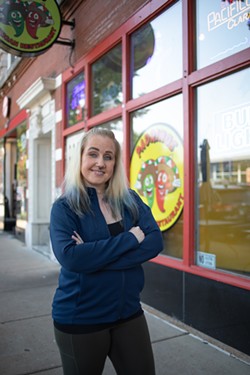
While many restaurant owners curse the city's complicated process, Christina Robles knows firsthand that there is a simpler way. As a business owner in both the City of St. Louis and Brentwood — Robles is part-owner of Padrino's Mexican Restaurant and Sal y Limon — she has navigated the two cities' processes and was struck by the ease with which entrepreneurs can do business in a St. Louis County municipality.
"The difference was night and day," Robles says. "In the city, it was four months of pain. I started the application in April and didn't get my license until September, which was two weeks after we opened. In Brentwood, it felt like I took a nap and got my license. I remember putting a couple of hours on the meter when I went in because I expected it to take a long time, and I was out in five minutes."
Obtaining a liquor license in Brentwood, like many other St. Louis County municipalities, does not involve gathering signatures. But that doesn't mean residents and neighborhood businesses were shut out of the process. Instead, interested parties are able to request a public hearing with Brentwood's Board of Aldermen before the license is approved. Robles believes that ensures their voices are heard, albeit in a different way.
The lack of a signature-based petition requirement meant that Robles was able to get Sal y Limon's liquor license in a matter of weeks. However, she notes that it is only part of the reason things moved quickly there. In Brentwood, the process is handled mostly online, instructions are clear and up to date, and processes are automated. In the City of St. Louis, by contrast, Robles describes a Chutes and Ladders-style runaround through an antiquated, and often out-of-date, system.
"I remember voicing my opinion strongly about how I am supposed to know what they want when they don't update the instruction sheet or website," Robles says. "And then I am running around from department to department; you have to go down and get approval here, then go there. When you get to an office they sent you to, they ask why they sent you. So then you go back up and tell them that they sent you back. It's insane."
Indeed, plenty of evidence supports Robles' view that the Excise Division is behind the times. Not only are meetings recorded using an eight-track player in the age of smartphones, in response to Sunshine Law requests from the RFT the division also reported that it does not have a system for tracking the license applications or their outcomes. It also doesn't keep minutes of any of the hearings. The eight-track recordings (and more recently, Zoom recordings) apparently suffice.
Eickenhorst echoes this sentiment. Though her main source of angst has been chasing down phantom business owners and neighboring tenants, she, too, believes the entire process is ripe for modernization, and she suggests that a clearer, more concise way of doing things would alleviate the burden for both applicants and those taxed with processing their applications. An Excise staffing increase, she noted in her April 3 letter to the mayor and Board of Aldermen, is only a Band-Aid fix.
While Brazell, Eickenhorst and Robles express frustration, their experiences have boiled down to the cumbersome signature gathering process and the backlog at the Excise Commission.
Lee and Park, however, cannot help but feel that something more nefarious has been at play for them. In particular, their dealings with an apartment manager who acted as a gatekeeper for the residents of her building — occupants who made up a significant percentage of the population from which Lee and Park needed signatures — left her feeling unwelcome, demeaned and demoralized. Park even recalls one incident, when she came to the door — obviously pregnant — and the manager refused to acknowledge her knocking.
"Personally, I feel that St. Louis has a really great local history; people are proud of their neighborhoods. But if you are new, you don't feel accepted," Park says. "I feel discriminated against. I think things would have been different if I was someone else."
Park is not alone in feeling this way. Since this past December, Ono Ikanone and his wife, Justice Johnson, have worked tirelessly to obtain signatures from the Washington Avenue community for their forthcoming Nigerian restaurant, Levels. The restaurant has been a dream of Ikanone's ever since he moved to the U.S. in high school, and after working as an engineer for the past few years, he finally decided to pursue it, purchasing the building at 1405 Washington Avenue that had been vacant for two years and was in such disrepair it was raining inside the building.
He assumed his neighbors would be excited to see the space rehabilitated, especially by a local family outfit. Instead, he faced intense pushback that made his dream feel like a nightmare.
"We purchased the building, and the first thing after that we were told we could not get a liquor license there, straight up," Ikanone says.
To better their odds, they hired Kelly, who reached out to the Downtown Neighborhood Association, or DNA, a nonprofit that advocates for residents. "When he told them the address, they sent an email back to him that they were very against anything that involves liquor and will probably give us pushback," Ikanone says. "There was already a preconceived notion that things would not go well here — that a neighbor had been selling alcohol illegally and that had been upsetting them. What does that have to do with my business? What does that have to do with me? That was the onset of everything."
Ikanone ultimately got the license on May 11, but only after he and his wife went on a six-month public relations campaign he describes as akin to the "shaking hands and kissing babies" tasks required of political candidates.
Ikanone does not take issue with the DNA's fiercely protective approach toward its community. His issue surrounds how members of DNA were influenced by a downtown resident who Ikanone says launched a blatant, racially tinged smear campaign against him that included a video, pulled together with clips from Ikanone's Instagram account, aimed at making it look like he was trying to launch a nightclub (one clip, Ikanone notes, was taken from a Nigerian Independence Day celebration).
"That shook us a bit and made us think that nobody will sign the petition because people will think we are something that we are not; that is the narrative we have to overcome," Ikanone says. "Essentially, he ran an anti-Levels campaign against us with all these people, and that's the problem with the signature process. If I were to band with someone and tell you that I'm not going to sign, you're toast. If another Nigerian restaurant wants to open across the street, and I don't want the competition, I could say they are unsafe and kill the business before it even starts.
"Yes, I still want the public to have a say in who moves in, but no one should have that kind of power to say, for whatever reason, that they don't want someone to move in — even if they clearly show the best intentions and are heavily invested in the community."
While Ikanone and his family ultimately got the signatures, the lengths he had to go through left him feeling insulted and low. He is adamant that he hates boiling things down to race, but he cannot see another reason for why he had to put so much effort into dispelling preconceived notions that Levels was going to be a nightclub when nothing in his business plan or background should have given anyone that impression.
Ikanone understands that the elephant in the room — and in any room where liquor licenses around Washington Avenue are being discussed — is the now-shuttered Reign nightclub. The bar made headlines over the years for numerous incidents, including multiple shootings, that ultimately led to a city-ordered shutdown two years after it opened in 2022. Ikanone also understands why his neighbors would be wary about another nightclub coming into the area (though Reign's owners have maintained the problems were not caused by the club but rather an overall uptick in crime in the downtown area).
What Ikanone cannot understand is what his family friendly Nigerian restaurant has in common with Reign. Other than one thing.
"People can decide not to sign for multiple reasons, and we cannot leave out prejudice and racism," Ikanone says. "With some of the things I have seen — I don't like to play that card, but how many credentials do I have to present to you? I have gone to school, worked as an engineer, and approached someone about this business concept, and they think, 'You are going to be like those other guys.' I don't even know those other guys."
Despite their struggles, Ikanone notes that he had a lot of things working in his favor and was uniquely positioned to fight as hard as he did. He had the resources to hire Kelly, well-placed allies in the community and contacts in his network who connected him with fellow restaurateurs like Eickenhorst, who shared her knowledge and offered support. He had the benefit of owning his own building.
And his heart breaks for those who do not.
"There is a guy out there that is just a chef and doesn't have [my] resources," Ikanone says. "He has an excellent idea for a business, but he is a young Black guy who is not going to get a liquor license no matter what he does. We will never know what he could have contributed because he doesn't have the resources I have."
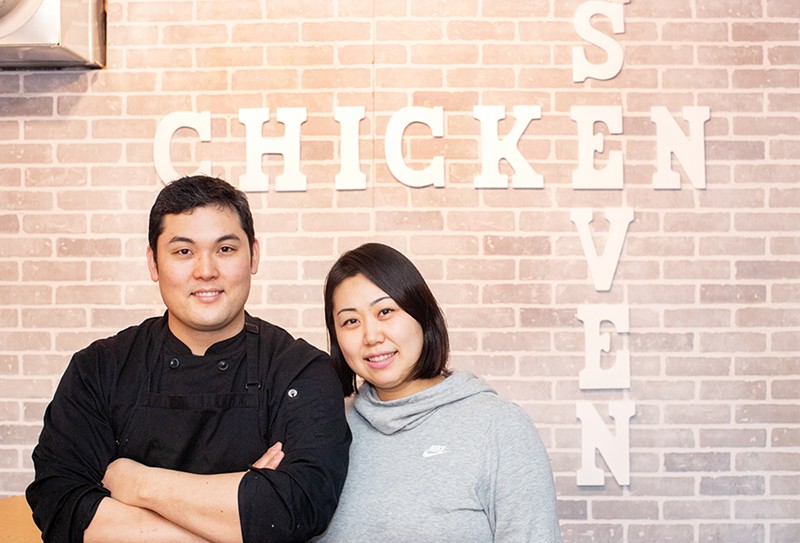
Ikanone's experience — as well as the experiences of Eickenhorst, Robles and the others leading the charge for change — has resonated with one important figure who has become an unexpected ally: the excise commissioner himself, Myles McDonnell.
McDonnell has been the commissioner since 2016, a position that he came to after spending 34 years as a special agent with the Missouri Department of Public Safety Division of Alcohol and Tobacco Control (he's also an attorney). He admits that when he first came onto the job, he hoped he might bring about reform, having heard even then complaints about the cumbersome process. Even if major changes would need to go through the Board of Aldermen, he figured he could help speed things up.
However, he quickly found himself handcuffed by the letter of the law and unable to do anything except execute a flawed process to the best of his abilities.
"I know for a fact that this process has discouraged people [from doing business in the city]," McDonnell says. "I had to feel sorry for some of these [applicants]. If they really want to do it right, and they are a chain place that comes in and has money, they can hire someone to do it. If you are a person who is trying to do it on a shoestring, maybe you don't have that."
McDonnell says recent short staffing has made things move especially slowly, even as he and his team work overtime. Turnaround times have recently quickened, thanks to Mayor Tishaura Jones shuffling around staff to bring more people into Excise — he notes that they recently went from having 30 applications in the queue to just 5.
McDonnell is more than amenable to bigger change. He was happy to participate in a recent meeting between St. Louis restaurateurs, the mayor's office and the Division of Public Safety, and feels heartened by what he sees as a genuine desire to address these issues on the part of the administration. He was also pleased to see the restaurant and bar owners present reasonable solutions to speed up the application process.
"It was a really good meeting, and we came up with some very good ideas on how to address this," McDonnell says. "The mayor is really interested in streamlining the process and making the city more business-friendly than it has been in the past. I think things are going in the right direction."
McDonnell knows that signature gathering is the biggest pain point — both for the restaurant and bar owners who need to secure them and for his office, which needs to verify them. He's open to seeing it change and was moved when Ikanone — who was also in the meeting — noted how unsafe he felt going door-to-door gathering signatures, especially in the wake of the recent shootings of a Kansas City man and New York woman who found themselves on strangers' property. However, McDonnell cautions that any solutions cannot be one-size-fits-all and should take into consideration the impacts that different types of business have in a community — for instance, sit-down restaurants versus packaged liquor stores.
McDonnell also believes that it is important to have a plan in place for how to address problem properties, should they arise, though he believes that his team within the Problem Properties Unit has the infrastructure in place to handle any issues. He notes that residents are able to express their concerns about problematic businesses through a liquor license protest petition which, like the application itself, requires obtaining signatures of 51 percent of interested parties within the 350-foot plat surrounding the business. Any solutions, he notes, will have to balance the needs of both the prospective business owners and the community.
"Everybody is working together for a common goal and positive one — to get things opened up," McDonnell says. "The mayor has really spearheaded this to streamline it and make it more business friendly, but any proposals being discussed have to be passed by the Board of Aldermen. There is only so much we can do."

Eickenhorst and Ikanone left their meeting with the administration upbeat, believing that they were finally making progress in their quest for reform.
"I felt heard, and I felt like the city was doing what it needed to do to help," Ikanone says.
However, any change to the actual ordinance establishing the city's liquor license process must happen through the Board of Aldermen — and at its May 5 meeting, it became clear that reform might not be as simple as some would like. Upon introduction of a resolution that would establish a Special Committee on Red Tape, Ward 12 Alderwoman Sharon Tyus expressed concern with efforts to make it easier to obtain a liquor license.
Citing a history of nuisance properties, the north city alderwoman spoke to the lack of agency residents of her ward have when it comes to addressing problem businesses. In particular, she described a business that has had five or six shootings in the last five or six months, yet the Problem Properties Unit cannot find a way to shut it down.
"I've often found that what people think is great in one part of the city is often not great in the other part of the city," Tyus said.
Alderwomen Anne Schweitzer offered similar thoughts.
"In my neighborhood, we have had problems with this on both ends of the spectrum," Schweitzer said at the May 5 meeting. "On the one hand, businesses have had to jump through so many hoops with so much effort to just get their businesses open in terms of whether or not you can even find the people to sign the petitions and whether or not there are enough people who live around the business to even possibly have a chance."
Schweitzer then echoed Tyus' sentiment about the difficulties her community has faced in revoking the licenses of problem properties. She, too, cited instances of shootings associated with bars or retail-sales spots, and noted how difficult the protest petition process is — just as difficult for concerned neighbors as the application process is for businesses.
"In the best-case scenario, this special committee could both address issues on the front end and the back end of the process so that when there are problems in our wards and our neighborhoods, that our citizens, our residents have the ability to fight back," Schweitzer said. "Because the liquor license process isn't only hard on the front end; it's just as hard at the back end when our folks need to address these issues in their community."
Like Schweitzer, Alderwoman Cara Spencer has sympathy for businesses whose applications have been on hold due to delays at Excise. It's an issue that prompted her to contact McDonnell last summer to complain about the backlog.
"I 100 percent see the problem, and I want to fix the problem too," Spencer says. "I stand with the restaurant and bar owners that are waiting ad infinitum, and this is totally unacceptable. The sale of liquor is vital to them."
Still, Spencer sees the problem as much larger than a cumbersome process, and is adamant that any potential solutions must address what she sees as general dysfunction within the Excise Commission, beginning with its antiquated systems and ending with its failure to provide timely relief to neighborhoods suffering from problem businesses. Citing Reign, as well as Exotic Bar and Grill — a Cherokee Street establishment that has been at the center of several incidents, including a brazen shooting on May 5 that left two dead and two wounded — she is exasperated that the community has no clear remedy for such issues.
As Spencer sees it, the enforcement piece of liquor control is broken, and problem businesses are not being held to account in any meaningful way. In that sense, community stakeholders feel that their only shot at making sure their neighborhoods stay free of problem properties is preempting them on the front end. Any talk of quieting their voices — for instance, doing away with the signature process — must be met with guarantees that they will still have a say.
"I would love to see a system in which the community could come and weigh in and laws were enforced in a general sense, but we are not there yet, and we have failed our community by failing to enforce the laws," Spencer says. "So many have been screwed over, and we are in a bad position now. It's important to speed up the process because right now it is totally unreasonable, but we also have to establish trust that once a license is granted, failing to abide by the laws will be handled appropriately by the city."
In their meeting with the mayor's administration, both Eickenhorst and Ikanone suggested that they would support a scenario in which it was easier to get the license up front but that it was just as easy to lose. Ikanone has even suggested that the city might explore a one-year probationary period, during which a business might be granted a provisional license while being subject to increased scrutiny before being awarded a full license.
No one is looking to disenfranchise their neighbors. In fact, they believe a mutually beneficial solution could end up strengthening the ties between businesses and their communities — one based on trust and the shared goal of creating a safe, vibrant neighborhood.
Even Park wants to see that happen. Over the 2½ years she and Lee have spent on their ill-fated attempt to obtain a liquor license for Chicken Seven, she's evolved in her position, moving from disbelief to frustration to understanding some of the resistance to their petition after experiencing several unpleasant incidents in the area herself.
"I do want to hear their opinion; if they disagree, they might be right," Park notes.
Even so, she suggests that any changes might be too late to change Chicken Seven's fate. Having just opened a new restaurant, Cafe Ganadara, in the St. Louis Hills neighborhood, she's ready for a fresh start — and maybe even a fresh process that will make things just a little bit easier for her and her family to get their license, should they even try again.
"I think it's our last year to run Chicken Seven," Park says. "We're just not making any money. In the end, we have to say we did our best, but we just couldn't get it."
Subscribe to Riverfront Times newsletters.Follow us: Google News | NewsBreak | Reddit | Instagram | Facebook | Twitter

